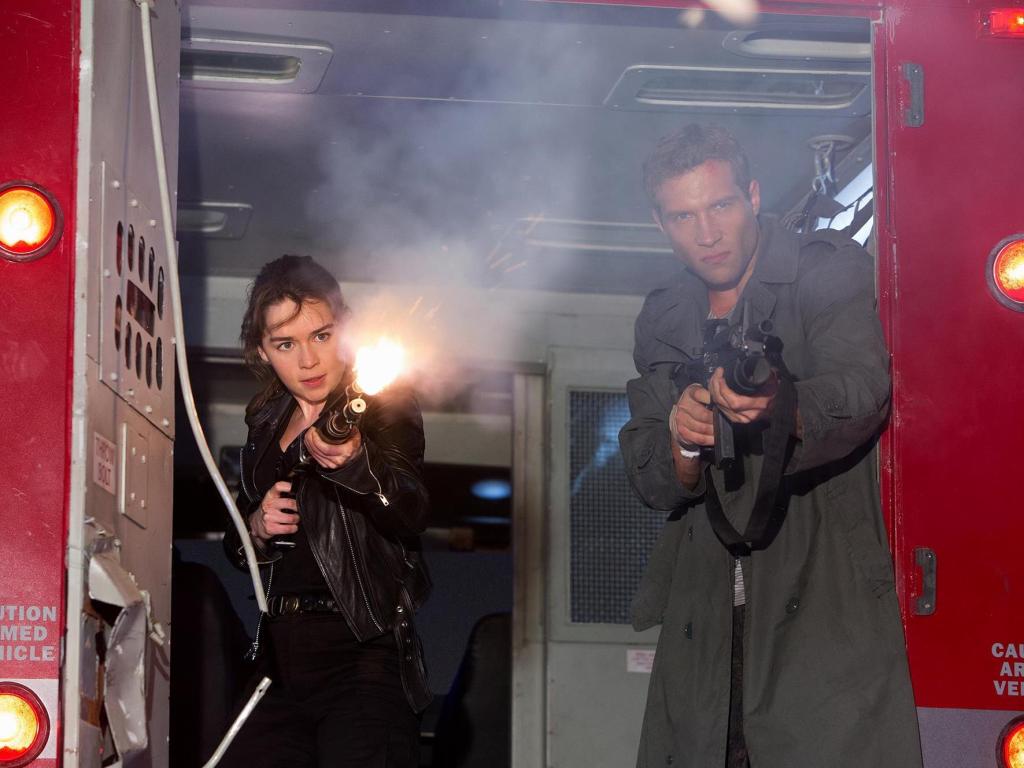Temporal trickery has always been at the heart of the Terminator franchise, that series of fights for survival between men and machines that started in 1984’s The Terminator and continued with spectacular action in 1991’s Terminator 2: Judgment Day. The franchise then limped along in 2003’s Terminator 3: Rise of the Machines and 2009’s Terminator Salvation, and took a detour to television with 2008’s Terminator: The Sarah Connor Chronicles. That such chronology twisting and traversing remains at the core of new addition Terminator Genisys should inspire little surprise, particularly in an effort that relives and recasts the original feature. But unexpectedly, playing with time proves to be the latest movie’s strongest element.
As fans will know and anyone who has seen even just a part of the saga should remember, the very first installment set a waitress from the 1980s against a cyborg from the future, with only another time traveller for assistance. Preventing the existence of the man who would become the leader of the resistance in a post-apocalyptic world ruled by an artificial intelligence was the titular figure’s aim. Successive chapters followed the same story, that of a controlling computer program using weaponised robots to thwart threats to its reign before they happen, and of humanity’s attempt to not just stop the assassination attempts trying to end their revolution, but to likewise preclude the emergence of their artificial overlords.
Terminator Genisys jumps into this familiar tale, director Alan Taylor (Thor 2: The Dark World) and writers Laeta Kalogridis (Shutter Island) and Patrick Lussier (Drive Angry) not just appropriating the same rough narrative as every effort in the franchise has done, nor simply including nostalgic references, recognisable faces and repeated shots, but using their film to recreate the events seen in the series’ origin. An already established future begets a second glimpse at the backstory, as well an alternate timeline, simultaneously adhering to the Terminator canon, reshaping accepted facts, and paving a path for assumed sequels to follow.
Here, it is Kyle Reese’s (Jai Courtney, The Divergent Series: Insurgent) perspective the feature favours over John (Jason Clarke, Dawn of the Planet of the Apes) or Sarah Connor (Emilia Clarke, TV’s Game of Thrones), the former the spearhead trying to save the human race, the latter the mother that taught him everything he knows. Reese is once more sent back from 2029 to 1984 to protect Sarah, though upon arrival he finds a machine (Arnold Schwarzenegger, The Expendables 3), nicknamed “Pops”, acting as her guardian. The two are actively conspiring to change the preordained order; however Reese’s input guides their endeavours towards 2017, where the ultimate in advanced operating systems is about to be launched.
In a time when remakes and reboots have become standard, productively weaving beloved existing material into a new outing is a rare occurrence. Trust the 31-year-old series to use its returning star – Schwarzenegger, in both exposition dump and self-deprecating modes – to make that plain in as blunt a manner as possible. Yes, the new version of his mechanised warrior does battle with the old, complete with special effects wizardry that ensures the younger android looks just as he did in his first Terminator outing.
That’s a touch of revisionism that works, as does much of Terminator Genisys‘ homage-like first half that clearly arises from a place of affection as much as it does from studio perpetuation. When the feature remembers that it needs to give Jason Clarke enough screen time to rationalise his casting and billing, it is far less successful, as are the corresponding story complications. A sense of structure glimpsed early quickly falls by the wayside, in favour of a string of visually impressive but emotionally hollow set pieces. Though where the movie is headed is dictated by the franchise’s adherence to formula, stepping beyond the reframing of prevailing bounds feels clumsy and forgoes tension, the skill demonstrated in the preceding narrative navigations absent.
As with its tale, and Taylor’s realisation of it in initially entertaining, eventually standard fashion, the film’s performances are similarly mixed. Acting may never have been The Terminator‘s strong suit, yet the portrayals it and Judgment Day presented became iconic; the best that can be said here is that the leads as a whole are sufficient, some more than others. Of the unrelated Clarkes, Emilia is given more to do than Jason, and makes the stronger impression in her determined, no-nonsense interpretation of Sarah than in his sometimes inspiring, sometimes menacing construction of John as a result. Courtney’s pivotal status isn’t justified by his bland turn, leaving Schwarzenegger to have the most fun, while RED 2‘s Byung-hun Lee (as a non-descript killing machine) vies for the most thankless role against Whiplash‘s J.K. Simmons (as a bumbling cop).
Of course, flaws are far from permanent in this filmic universe, as its ability to power past the less welcome Rise of the Machines and Salvation, and shape a fresh effort through gleefully tinkering with Terminator mythology shows. Perhaps that’s why Terminator Genisys still largely engages, its shortcomings apparent but enough energy seeing it through until another installment, complete with an accompanying twist of time, comes along to render it moot.
Rating: 3 stars out of 5
Terminator Genisys
Director: Alan Taylor
USA, 2015, 126 mins
Release date: 1 July
Distributor: Paramount
Rated: M
Actors:
Director:
Format:
Country:
Release:





